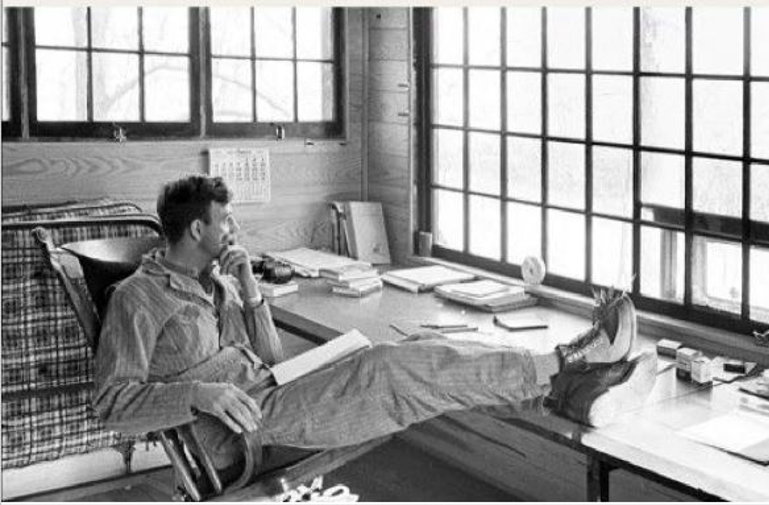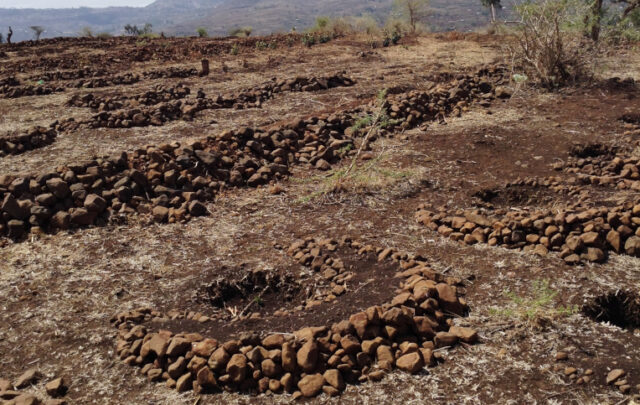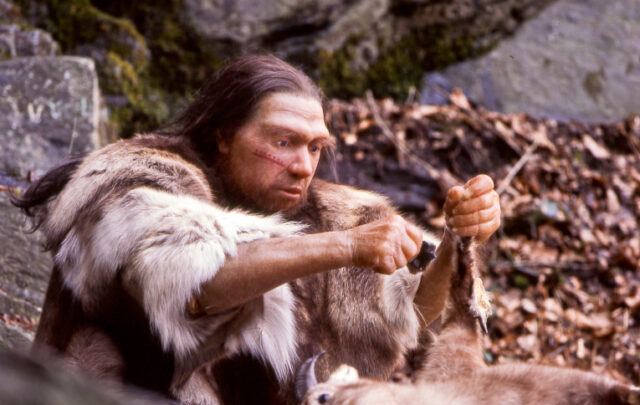How do we cultivate a sense of place in an industrialized, globalizing world? Writer and farmer Wendell Berry discusses the role of agrarian values in nurturing communitarian consciousness with Tellus Senior Fellow Allen White.
You have written eloquently about how growing up in a farming community in northern Kentucky, where your family has lived for generations, shaped your life and work. Tell us about this experience and its influence on your life choices.
I grew up in Henry County, Kentucky, which at the time of my birth and for a while afterward was an agrarian county. The businesses in the towns were supported by agriculture, which they, in turn, supported. My father was a lawyer who all his life was also a farmer. He made sure that I learned farming, as well as the principles of the organization he served, the Burley Tobacco Growers Co-operative Association. By means of price supports and production controls, it maintained the small farmers of this part of the country for about six decades. Tobacco became indefensible after the 1965 Surgeon General’s report, but the principles of the Association remain right for agriculture.
My father, a principled agrarian, was concerned about having a writer for a son, afraid that I wouldn’t make enough money to feed my family. But two things happened. One was that I became gainfully employed; the other was that my writing, especially the Unsettling of America (1977), revealed to him how much I had inherited from him and how my work carried his values on into my own life and time.
Early on, you appeared to be on a cosmopolitan career track—spending a year in Italy and France on a Guggenheim fellowship and teaching at New York University. Then, in the 1960s, at age thirty, you returned to Kentucky to farm and write. Was there something about the times that prompted this decision, or do you think it was always in the cards?
My wife Tanya and I lived two years on the West Coast, a year in Kentucky, a year in Europe, and two years in New York. As I grew up and met teachers in the schools I attended, I learned by implication, and sometimes by direct statement, that a boy raised in the circumstances of my early life couldn’t expect to amount to much. I would have to leave my home place behind. I grieved over that from my high school days, but I learned to accept and even to affirm it as the right way to go. So I just assumed that I would be an academic careerist.
Then I got invited, with the help of recommenders such as Wallace Stegner, my teacher at Stanford, to come back home and teach at the University of Kentucky. At first, we assumed that we would live in Lexington, where the university is, but we wound up living in my own home community, the home community of both sides of my family. The tumultuous political climate of the 1960s was sort of fended off by the tumult in our own lives. But, after we were settled, the tumult began to be the Vietnam War. I did, so to speak, come alive to the anti-war movement. I had to think things through very carefully then. My thinking became complex, and I began to doubt that war could be a solution to anything. I became conscientiously a pacifist, not by nature but by thought, by determination. I’m not a very pacific person. It forced my thinking back and forth, so to speak, between the public issues and my own personal life and inheritance.
You have published prolifically across genres—poetry, novels, and short stories, as well as essays on cultural criticism and environmental awareness. Do you see these as separate endeavors or part of a literary whole? Specifically, what do you see as the role of your fiction in fostering greater social consciousness?
I have used those genres, not because I wanted to be a diverse writer, but because I needed them at various times and for various reasons. I grew up, for instance, among storytellers, and it was a fairly natural thing that I became, in fiction, a storyteller. When I began to understand how my own community was devalued in the context of the social and economic assumptions of that time, I began to need essays. I began to see that communities such as mine, and the inheritance I received from those communities, amounted really to nothing in terms of the economic assumptions of the time. Such places are still considered to be “no places.” That’s the kind of thing that I had to form myself in opposition to.
I don’t think about the readers or the influence I’m going to have on them. That would be a distraction from the work. You hope the people who build your airplane are not thinking about how it’s going to go over with an audience of some kind. People need to think about their work, their vocation. And so, when I’ve had a story to write, my aim has been to understand the story and the people in it, as well as how such a story could have happened. Not how it’s going to impress readers, whom I can appropriately honor only by writing well.
How do I see the role of my fiction in fostering greater social consciousness? That’s an interesting question because, if you’re an imaginative writer, you don’t think about how your writing is going to serve an abstraction like social consciousness. From my point of view as a story writer, a story hearer, a ponderer over stories, I’m not sure that I understand what social consciousness is. You have to offer the best thing you can. Things come to you as tasks needing to be done, and you accept them on the terms on which they’re offered and make the best work you can of it. That’s the way it has been for me.
[slide-anything id=’3472166′]
You are a champion of “agrarian” values. What are these values, as you understand them?
Because of questions like this, I took some care in the introduction to my latest book to write out a list of agrarian values. A shortened version would be:
1. An elated, loving interest in the use and care of the land.
2. An informed and conscientious submission to nature.
3. The wish to have and to belong to a place of one’s own, as the only secure source of sustenance and independence.
4. A persuasion in favor of economic democracy; a preference for enough over too much.
5. Fear and contempt of waste of every kind, and its ultimate consequence in land exhaustion.
6. A preference for saving rather than spending.
7. An assumption of the need for a subsistence or household economy.
8. An acknowledged need for neighbors, and a willingness to be a good neighbor.
9. A living sense of the need for continuity of family and community life.
10. Respect for work, and (as self-respect) for good work.
11. A lively suspicion of anything new, contradicting the ethos of consumerism and the cult of celebrity.
That is my list.
You’ve been a vocal, sometimes scathing critic of industrial society. Is the mismatch between agrarian and industrial values so profound, so enduring, that there’s little hope for reconciliation? Or are there windows of opportunity where the two can be at least reconciled if not harmonized?
We are going to have to talk about these two kinds of life and economy in order to stay on speaking terms and to have some measure of peace between them. But industrial values are exactly contrary to the agrarian values I’ve just listed. The ideal of industrialism is for people to have to purchase everything they need. In other words, the old dependence on nature and neighbors and self-employment—that basic sufficiency and self-sufficiency––are to be replaced by merchants and merchandise. We have to understand how radically these two ways of life are opposed before we can talk about the conversation that needs to occur among us, across our division.
That division is exemplified by the history of Harry M. Caudill’s 1963 Night Comes to the Cumberlands, about coal mining in Eastern Kentucky and its local damages, which have become steadily worse ever since. That book drew the attention of the federal government, and was largely responsible for the War on Poverty. All kinds of bureaucrats and well-intentioned people turned up in the Appalachian coal fields. But while the problem of poverty was supposedly being dealt with, the land under the people’s feet was being destroyed by surface mining. Both the condition of the people and the condition of the land got worse.
Another example of the divergence between industrial and agrarian values is Walmart’s new bottling plant in Indiana, which has brought failure to a hundred small dairies in my region for the sake of administrative efficiency. Walmart would rather deal with one thousand-cow dairy than with twenty fifty-cow dairies. But the twenty fifty-cow dairies would have a much higher social value than one thousand-cow dairy.
So there is a fundamental conflict. The problem is getting the social value of the agrarian way of life recognized. Industrial agriculture’s fundamental premise is that corporate profit is the top priority.
Today, there is a surge of interest among young people in ecological farming, and a commitment of many to practice what they (and, notably, you) preach. Surely, this must warm your heart. Does it also give you hope that a great transition in the way we use and relate to the land is possible?
Well, it is not something that in any simple way could grow into a positive thing. You raise the issue of hope, and one doesn’t want to be silly in hoping. A number of people have written to me to say, “I’m going to quit my job and start a small farm.” And I’ve written back, “Don’t do it. If you want to buy a little farm instead of a house in town, that’s fine. But you better keep your city job. And don’t bet your life on your ability to farm if you don’t already know how.”
You don’t want to discourage people, but you want to help them to think. You don’t want to be responsible for somebody quitting a well-paying job and moving to some little farm, and trying to make a living from it against the odds. The agricultural economy has almost always, from the earliest times, been slanted against the primary producers––the real risk-takers, the real workers. It’s terrible. Right here in my own county, two families of dairy farmers—third-generation, well-intentioned young people—have been essentially put out of business by Walmart. One hundred of them in this region. How cynical is it then to tell these young people, “You can be anything you want to be”?
Industrial agriculture replaced the war industries after World War II, when it was still possible to be naïve about industrialism. But rural America is in terrible shape now. And almost nobody acknowledges this. This is our country out here, the country known as the United States of America, where the farmers are going broke.
People have asked me about hope so much that I have quit speaking directly to that issue. I want to talk instead about doing the right thing. The right way, for instance, to treat a neighbor. We have had instructions on this for thousands of years. We know how to take care of a neighbor. We have the parable of the Good Samaritan. A major problem in rural America is the refusal of corporations to be good neighbors, or neighbors at all. They don’t know the word.
The US is over 80 percent urbanized and the world 55 percent (a figure projected to rise to about 70 percent by 2050). How can the agrarian values you advocate be adapted for a world where more and more people live in cities?
For a good many years, Louisville, Kentucky, has been attempting to give a responsible answer to those of us who live out here in a well-watered, fertile landscape that could be prosperous if it were feeding Louisville. And there are people in Louisville, including the mayor, who are in favor of a regional food economy that would sustain both the city and its rural neighbors. But it’s amazingly hard to get that done. Our county judge recently reminded the mayor of Louisville that we’ve been working on this for years, and not one farmer in Henry County has been helped.
Somebody from Louisville who knew something about farming could come out here and say to a farmer, “What do you have that we could help you sell to us?” That hasn’t happened. By contrast, my daughter started several years ago what we call the Berry Center in order to keep alive my father’s advocacy for production controls with price supports. And she has started a beef-marketing program with ten local farmers. The contrast is extraordinarily suggestive to me. I think Louisville is attuned to the idea that we should do this as a big thing, whereas my daughter has mastered the necessary understanding that whatever is done has to start small. The great test is your willingness to do the local small thing that obviously needs to be done.
We could have a regional economic connection that would help us all to prosper. Martin Luther King thought that the right thing serves everybody. I think all of us who are involved in this conversation are perfectly willing to carry it on, as long as necessary, however absurdly disjointed it may become. We’re in it for good; we’re going to keep on.
But it must happen by way of conversation. People are well motivated in both places. Farmers certainly understand that they are no longer numerous enough to carry anything in their favor politically. They need city help. There are people in the city who understand the situation within limits, and those limits probably are expanding as a kind of urban agrarianism.
The concept of a “place”—a living community where individuals find the identity that can undergird a commitment to stewardship and reverence for the land—is central to your thinking. As the world grows increasingly interdependent, we all, in some sense, become citizens of a “place” called Earth. Do you see a need and possibility for forging multiple identities, or multi-level consciousness, from the local to the global?
I don’t know any other place as carefully as I know this place, but if that amounts to anything more than a hobby, it has to mean that I honor the possibility that other people in other places would know their places as carefully as I know mine, and might be as highly motivated to defend their places as I am to defend mine. If your love for your children doesn’t enter your imagination so that you can honor other people’s love for their children, then we end up bombing children.
My little neighborhood of Port Royal is dependent on the earth. The earth is dependent on the universe. But in a way, the planet––people love to talk about the planet––is somewhat theoretical. There are millions of places on this planet that I don’t know at all. But I have to be ready, if my love and knowledge of this place has spoken to me, to receive people coming from those other places, and say, “Look, these little places need to become a common cause.” That would lead to conversation, the kind of conversation that I long to see take place. It’s imaginable insofar as we can develop the vocabulary, the way of talking, to convey our own particulars to other people.
The Great Transition seeks to advance a global citizens movement in which disparate social movements—e.g., economic justice, peace, climate, environment, gender equality—across spatial scales converge to drive the kind of systemic change you have long envisioned. Of course, while the social ferment for such change is evident, building and harnessing this movement will be a long haul. What advice would you offer those working to nurture such collective action?
I think there is a common ground. These various movements can come together. But if they remain specialized, they can’t do that.
The issue of scale needs to be paramount, because it requires us to acknowledge our limits as human beings, as members of a species that is limited, and as individuals who are limited. If we keep trying for things that we can’t actually do, we hurt our causes, whatever they are.
People ask me, “How do you reform industrial agriculture?” And I’ve always said, “If I had the answer to that question, you’d better be scared of me because I would be Mussolini.” I don’t know how to bring about a major transformation of a huge economy, one that is essentially a global economy. I do know how to do certain small things. I could be a decent neighbor to my neighbor, for instance. If I work locally, as my children are doing, there are certain things I could learn to do that are small in scale, but promising.
The conversation we need requires all the disciplines. All of them. Wes Jackson and I have talked at length about the departmentalization of the intellectual structure of, say, a university and how you might get beyond that. You could do it by starting a conversation.
Suppose you took a bunch of people out of their departments and had them sit down here on the bank of the Kentucky River, and asked a simple question: “What has happened here?” You couldn’t answer that question in a department. First, you know you are going to need a chemist, if you haven’t included one already. You are going to need a geologist or a historian. You may need somebody who understands the traditional music of these country communities. Who knows?
Then you could go on to the question: “What ought to happen here?” You have reformed the specialized structure, you see, simply by asking a necessary question. But these people have to be capable of talking to each other, so they can’t speak in that jargon that the specialists have learned to speak in order to remain specialized. Local people would hear about it and begin to take part. And the pressure that would come onto the conversationalists, you see, would shift it in the direction of place-based knowledge. “Come, friends, let us sit down together. Not in a lecture hall, not in a laboratory, not in a political forum. Here on the banks of the Kentucky River, let us sit down together and see what went on here. What’s going on here now? Why is it the way it is now? What do we want?”























